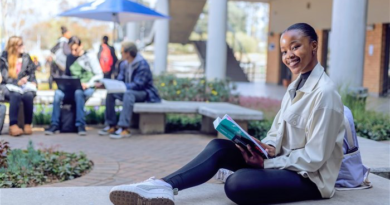Cell C appoints Stephen Morony as its new chief officer: wholesale business
Taking place at the Stias Wallenberg Research Centre in Marais Rd in Stellenbosch this week (16-20 January 2023), the initiative brings together both distinguished and young scholars from all over the world to debate some of the world’s most pressing issues in the field of international law, policy and economics.
The aim of the GSA is to invest in the next generation of scholars by placing them in conversation with their global peers, thereby strengthening their ability to think in new ways about global issues that the world faces – ranging from structural poverty, human rights, inequality and migration to international economic and legal policies, environmental sustainability and global security.
The event will see participants engaging in writing workshops and present their research-in-progress to be debated by their local and international peers in a round-table format. Leading experts will also participate by presenting opening lectures or by facilitating the round-table discussions.
Topics that will be debated include social justice; land reform, constitution and transformation; pathways to economic development and justice; and human rights obligations under South Africa’s domestic refugee law.
“We expect to see a wave of new ideas and multidisciplinary research as a result of this unique platform in which some of the world’s promising young researchers can engage, explore new ideas, and network at both an individual and institutional level,” says Professor Nicola Smit, Dean of the Faculty of Law, who collaborated closely with IGLP Director Professor David Kennedy (see info) and SU International in bringing the Academy to Stellenbosch.
High-profile speakers and plenary sessions include:
- David Kennedy (Harvard Law School) and Nicola Smit (SU Faculty of Law): plenary sessions.
- Thuli Madonsela (SU) – Taking Social Justice seriously: Can serious gaming stop injustice from mugging peace and security.
- Nik Rajkovic (Tilburg Law School) – Critical Geographies
- Horatia Muir Watt (Sciences Po Law School) – Transnational Public and Private Reimagined
- Maddy Chiam (LaTrobe Law School) – Writing workshops
- Helena Alviar (Sciences Po Law School) – Formality and Informality in the Law of Property
- Diamond Ashiagabor (Kent Law School) – Labor, Justice, and the Future of Work
- Nkatha Kabira (the University of Nairobi and Harvard Law School) – Law and Development
- Dennis Davis (High Court, South Africa) – International Economic Law in Global Political Economy
Other topics and speakers include:
- Land Reform, Constitution, and Transformation: Tembeka Ngcukaitobi (University of Cape Town/High Court of Cape Town) and Michelle le Roux (University of Cape Town/University of Witwatersrand/High Court of Cape Town)
- Constitutions and Equality: Cathi Albertyn (University of Witwatersrand)
- Pathways to Economic Development and Justice: Michael Sachs (University of Witwatersrand) Nthabiseng Moleko (SU)
- Domestic Refugee Law: Fatima Khan (University of Cape Town) and Sonia Human (SU)
Further topics include: Science and Technology Studies; Legal Thought in Critical Theory, Critical Geographies; Re-imagining the Corporation in the African Context; Transnational Public and Private Reimagined; International Law; and Clinical Education and Access to Justice.
Collaboration
The two partner institutions will also work towards closer collaboration between the universities of the global North and those of the global South.
ABOUT THE IGLP AT HARVARD LAW SCHOOL
Founded in 2009, the IGLP is a collaborative effort to nurture innovative approaches to global policy. For a decade, it has focused on young scholars and policy makers bringing new ideas and perspectives to comparative and international legal research and policy. Through successful partnerships with academic and policymaking institutions across the world, the IGLP has trained more than 1200 junior scholars and university teachers from almost 100 countries at intensive Workshops held in Cambridge, Doha, Cape Town, Bogota, Bangkok, and Madrid. Over 190 faculty from dozens of universities on every continent have donated their time as Workshop mentors and teachers. More than 1500 papers have been presented at biannual global conferences. Over the last decade, a truly global scholarly network has been born. IGLP’s alumni have drawn on this expanding network to support workshops and conferences of their own, to collaborate with one another in research, and to bring their work to publication.
ABOUT STELLENBOSCH UNIVERSITY
Stellenbosch University (SU) is home to an academic community of more than 32 000 students, including 4 000 foreign students from more than 100 countries, and more than 3 000 permanent employees, including 1 000 academics, across five campuses. State-of-the-art, environmentally friendly facilities and technology, and visionary thinking about the creation of a sustainable 21st-century institution, makes for the unique character of SU. The University pursues the vision to be Africa’s leading research-intensive university, globally recognised as excellent, inclusive and innovative, where we advance knowledge in service of society. In line with this vision, the SU aims to be a leading centre for academic excellence, research prowess and welcoming multicultural exchange. This quest contributes to SU’s principal mission to advance quality higher learning, research excellence and knowledge to gain broader social benefit of the world we live in. The historical oak-lined university town of Stellenbosch amongst the Boland mountains in the winelands of the Western Cape creates a unique campus atmosphere, which attracts local and foreign students alike. For more information visit http://www.sun.ac.za/
Source: bizcommunity.com


